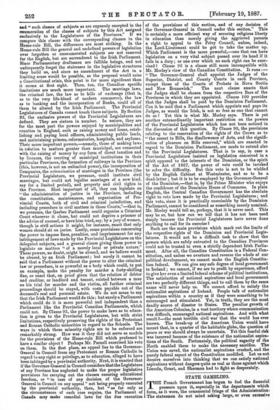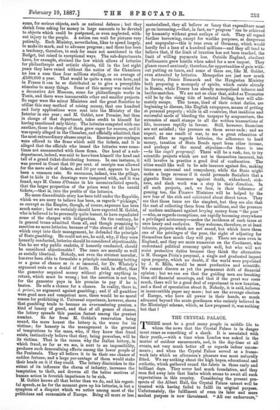STATE GAMBLING.
THE French Government has began to feel the financial pressure upon it, especially in the departments which form, as it were, the ornamental fringe of the Administration:
sums, for serious objects, such as national defence ; but they shrink from asking for money in large amounts to be devoted to objects which could be postponed, or even neglected, with- out injury to the people. A nation can wait for pictures very patiently. Each Ministry, nevertheless, likes to spend largely, to make its mark, and to advance progress ; and there has been a tendency, therefore, to seek for sums not mentioned in the Budget, but raised in exceptional ways. The sub-departments have, for example, strained the law which allows of lotteries for philanthropic and artistic objects, till in the last eight years they have raised without the notice of the Chambers no less a sum than four millions sterling, or an average of £500,000 a year. That would be quite a sum even here, and in France it can be so distributed as to give a perceptible stimulus to many things. Some of this money was raised for a decorative Art Museum, some for philanthropic works in Tunis, and there were innumerable other and smaller projects. So eager were the minor Ministers and the great Societies to utilise this easy method of raising money, that one hundred and forty applications were sent into the Ministry of the Interior in one year ; and M. Goblet, now Premier, but then in charge of that department, takes credit to himself for having sanctioned only thirty. The lotteries competed with one another, those in charge of them grew eager for success, and it was openly alleged in the Chamber, and officially admitted, that the most extraordinary abuses crept in. Enormous per-centages were offered to the firms which sold the tickets, and it is alleged that the officials who issued the lotteries were some- times not unconnected with these firms. One head of a sub- department, indeed, was said to have been himself the head and tail of a grand ticket-distributing bureau. In one instance, it was proved in Court that 60 per cent, of receipts was allowed for the mere sale of tickets, and 50 per cent, appears to have been a common rate. So enormous, indeed, was the pillage, that to hide it the drawings were tampered with, and it was found, says M. Cuneo d'Omano in his uncontradicted speech, that the larger proportion of the prizes went to the unsold tickets,—that is, into the profits of the lotteries.
No more discreditable story has been told under the Republic, which we are sorry to believe has been, as regards "pickings," as corrupt as the Empire, though, of course, exposure has been much easier ; but we certainly should have expected M. Goblet, who is believed to be personally quite honest, to have repudiated some of the charges with indignation. On the contrary, he in general terms admitted them all, and though promising to sanction no more lotteries, because of "the abuses of all kinds" which crept into their management, he defended the principle of State gambling. He could not see, he said, why, if they were honestly conducted, lotteries should be considered objectionable. Can he see why public roulette, if honestly conducted, should be considered objectionable? The cases are morally as well as socially identical. Nobody, not even the strictest moralist, has ever been able to formulate a principle condemning betting or a game of chance as in se immoral, for Dr. Whately'e argument rests on a denial of facts. He said, in effect, that the gamester acquired money without giving anything in return, which must be wrong ; but the assertion is not true, for the gamester pays in his promise to pay if he is beaten. He sells a chance for a chance. In reality, there is, a priori, no argument against gambling ; and if all gamblers were good men and competent men, there would be no moral reason for prohibiting it. Universal experience, however, shows that gambling tends to become an overmastering passion, a kind of lunacy of greed, and that of all games of chance, the lottery spreads this passion fastest among the greatest
number. So far from M. Goblet's reservation being sound, the more honest the lottery is, the worse for its victims ; for honesty in the management is the greatest of temptations to the mass, who, if they know that fraud exists, instinctively believe that they, being powerless, will be its victims. That is the reason why the Italian lottery, in which fraud, so far as we see, is next to an impossibility, produces such demoralising effects among the lower people of the Peninsula. They all believe it to be their one chance of sudden fortune, and a large per-centage of them would stake their heads on it if they could. The lottery diminishes to the extent of its influence the charm of industry, increases the temptation to theft, and drowns all the better motives of human action in feverish impatience to be rich.
M. Goblet knows all that better than we do, and his regret- ful speech, as he for the moment gave up his lotteries, is but a symptom of a disquiet which we notice among most of the politicians and economists of Europe. Being all more or less
materialised, they all believe or fancy that expenditure must go on increasing,—that, in fact, no" progress 'can be achieved by humanity without great outlays of cash. They all regard further borrowing, except for warlike purposes, as dangerous and unpopular—this is true even of Germany, which would hardly feel a loan of a hundred millions—and they all tend to believe that, if the limit of taxation has not been reached, the limit of willing payments has. Outside England, obedient Parliaments grow hostile when asked for a new impost. They glance round anxiously, therefore, for opportunities of gain with- out putting on taxes, and some of them are, like M. Goblet, even attracted by lotteries. Monopolies are just now much in favour, Prince Bismarck and the Hungarian Ministry both proposing a monopoly of spirits, which exists already in Russia, while France has already monopolised tobacco and lucifer-matches. We are not so clear that, aided as Treasuries will be by the rising tide of teetotal feeling, beer will ulti- mately escape. The towns, tired of their octroi duties, are beginning to discuss, like English ratepayers, means of getting at personal property ; while in all countries, that insidious and successful mode of bleeding the taxpayer by acupuncture, the extension of small stamps to all the written transactions of life, increases rapidly in favour. Still, however, financiers are not satisfied ; the pressure on them never ends ; and we expect, as one result of war, to see a great relaxation of moral fibre as regards lotteries, the adherence to hard money, taxation of State Bonds apart from other income, and perhaps of the moral objection—for there is one —to the impet progressif There will be a rush, too, to try scientific projects which are not in themselves immoral, but will involve in practice a good deal of confiscation. The cities would like well to be sole insurers against fire, making insurance universal and compulsory, while the State might make a large revenue if it could persuade Socialists that a gigantic State insurance against death, widowhood, sick- ness, and slack work was a step in their direction. In all such projects, and, we fear, in their tolerance of gaming too, the Finance Ministers will be helped by the new fear of the rich and cultivated about direct taxes. They see that those taxes are the simplest, but they see also that the cost of collecting them from the millions, and the pressure of modem sentiment against levying money from "the poor" —who, as regards exemptions, are rapidly becoming everywhere a privileged aristocracy—makes the incidence of such taxes at once heavy and exclusive. They welcome, therefore, or at least tolerate, projects which are not sound, but which leave them one of the privileges of the poor, the right of adjusting for themselves how much they will pay. There are men even in England, and they are more numerous on the Continent, who understand political economy quite well, but who will not resist protective duties because they think the alternative is M. Georges PCrin's proposal, a single and graduated impost upon property, which no doubt, if the world were populated by J. S. Mills, would be most productive and scientific. We cannot discern as yet the permanent drift of financial opinion ; but we can see that the guiding men are breaking from old financial moorings, and that if the great war costs much, there will be a good deal of experiment in new taxation, and a flood of speculation about it. Nobody, it is said, believes in inconvertible paper any snore; but are the average electors of Europe, who have all power in their hands, so much advanced beyond the acute gentlemen who entirely believed in the Mississippi scheme, which, as Law proposed it, was nothing but that



































 Previous page
Previous page